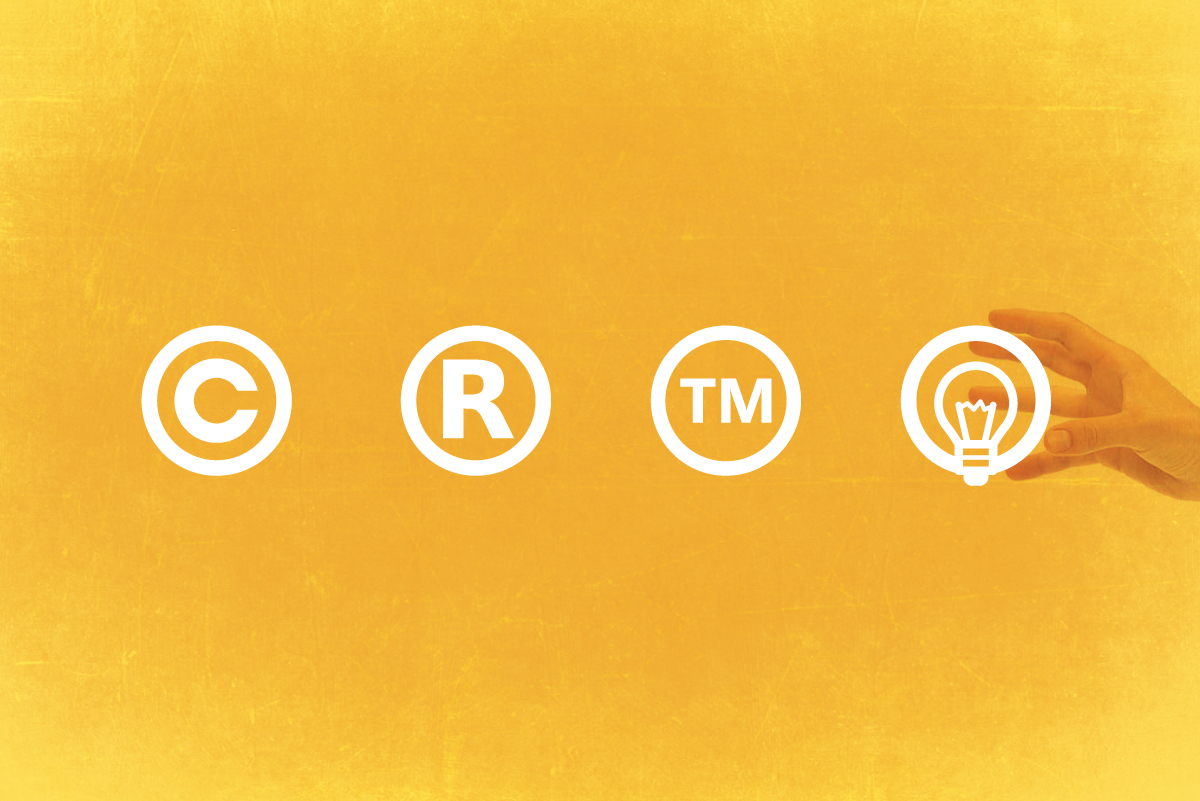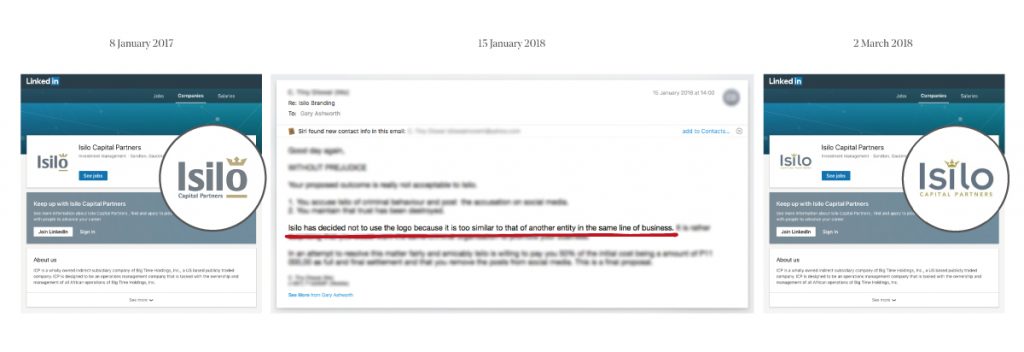
Intellectual Property Theft
- by gmashworth
- in Miscellaneous
- posted January 19, 2018
In common usage, theft is the taking of another person’s property or services without that person’s permission or consent with the intent to deprive the rightful owner of it. — Wikipedia
This is the common definition of theft; however, theft seems to be open to interpretation when it involves the graphic design industry. For the most part, those who procure graphic design services are fantastic and appreciative; I have many clients that can be described using those two words. However, there are companies and individuals that choose to deprive designers of payment, and sadly, I was the victim of such abhorrent behaviour. Allow me to summarise my experience.
In September 2017, I submitted a brand proposal to an organisation based in New York. The proposal contained branding options for a new firm they were launching in Johannesburg. In November 2017, a senior representative of the Johannesburg firm informed me she would “facilitate payment.” However, in January 2018, I discovered they had used one of the logos contained within my proposal on their website! I had no idea they had made a decision, and I had received no payment, so ultimately, they did not have any ownership rights or my permission to use any of the logos submitted.
To most people, I’m sure this seems very trivial and inconsequential. However, the organisations involved cannot be described as trivial or inconsequential entities. According to the New York firm’s website, they have more than US$25 billion in committed capital. The Johannesburg firm plans to explore growth opportunities across Africa, seeking to invest in smaller-sized companies with a minimum investment of US$1 million and a cap of US$10 million. Both organisations have the capital to invest in the services they require, such as branding, but on this occasion, they chose not to.
Summary of the Facts:
My fee was originally unchallenged: My quotation was sent and received in September 2017. Representatives of both organisations received my invoice in November 2017. I was informed by a senior representative that she would “facilitate payment.” Both my quotation and my invoice were accepted and unchallenged. There was no indication that either organisation had any reservations or second thoughts.
My artwork was unlawfully used: Whilst awaiting payment, I discovered in January 2018 that my artwork featured on both the Johannesburg firm’s website and LinkedIn page. The artwork was not paid for and was the intellectual property of Blue Zebra Creative; therefore, the use of the artwork was a direct violation of my terms & conditions, which they had received with my quotation. I also include a disclaimer at the back of proposals stating that any artwork should not be used or displayed within the public domain until full payment has been received.
My artwork was intentionally stolen: The artwork could only be obtained by improper means, as it was contained within a secure PDF document. The artwork was extracted from my proposal and manipulated; this can only be accomplished by a professional with knowledge of the relevant creative software. Clearly, a representative from one of the companies (someone with questionable ethics) instructed a professional to effectively steal the logo from the proposal.
Silence speaks volumes: I have written to several members from the New York-based company twice, and not one recipient has engaged me in any form of dialogue, positive or otherwise. I did receive a ‘read receipt’ from one of the recipients and another automated notification informing me that another recipient (a key figure in this situation) had actually deleted my email without opening it. I feel their silence speaks volumes; it’s evasive and raises questions.
My only contact throughout this fiasco was with the CEO of the Johannesburg firm. After I had discovered the theft and unlawful use of my design, I immediately communicated with her, and the response was:
“It doesn’t refer to any discounts on your original fee as it is on the high side and we are unlikely to use the logo going forward.”
This response did not address her promise to “investigate the matter” and makes no reference to the misdemeanour. I’m not sure what gave her the impression I would apply a discount, and to say they “are unlikely to use the logo” after the fact they already used the logo is just idiotic. She later offered to pay 75% less than the amount I was owed, which I declined. I wanted full payment and, in addition, I wanted at least 50% of the fee by means of compensation for the misdemeanour. Her response was:
Given that the original assignment was not delivered as initially conceived and relations have since broken down and [name of company] is not going to use your design going forward, I do not see how we can resolve the matter as you suggest”
At this point, I felt as though I was having this discussion with a committee. “The original assignment was not delivered as initially conceived” implies they approved the assignment in the first place—that I submitted a brand proposal that was accepted and evaluated. So how, then, was the assignment not delivered? Those involved clearly recognised the utility value of the logo they stole, regardless of how long they intended to use it. In addition to full payment, shouldn’t there be compensation for bad faith… maybe even an apology?
I reiterated my terms, and the response was:
The company has decided not to use the logo because it is too similar to that of another entity in the same line of business.
The only consistent message throughout all our discussions has been that the organisation has taken the decision not to use the logo—despite the fact that it wasn’t theirs to use in the first place. Now, finally, a reason for not using it has been disclosed—something they failed to mention previously. Sadly, I can’t even corroborate their claim, because they didn’t name the entity in question. The irony is, I had provided four options. Had they conducted themselves professionally, they could’ve easily selected one of the remaining three.
Still, I tried to remain objective and even proposed a compromise: I would accept full payment without additional compensation. That offer was ignored. From that point on, all I received was the same 50% offer—this time with “WITHOUT PREJUDICE” stamped at the top of every communication.
I do recognise that the firm has made an offer—but not a fair one. The outcome is deeply frustrating. I’m not fabricating accusations, and the facts are irrefutable, yet they refuse to take responsibility or simply do the right thing. The situation has been manipulated so the perpetrator appears reasonable and the victim, unreasonable.
The emotions I’ve experienced throughout this episode have been unpleasant, to say the least. I’ve felt foolish and defeated. I invested hours—weeks—into this project. Knowing that my work was a serious consideration for firms based in both New York and Johannesburg left me with a deep sense of achievement. I don’t make a habit of sharing bad client experiences online, but I believe this incident deserves exposure. If an organisation of this magnitude can be so callous to a “nonentity” like me, how many other small businesses have they swindled? How far are they willing to go to get what they want?
Design is not my hobby. I’m not running a tuck shop—this is my livelihood. I have every right to take this personally. How can someone unlawfully use my work, then turn around and try to haggle the price as if this is a simple sales pitch? I have every right to be upset. I have every right to post my concerns as a warning to others. And I absolutely have every right to demand my dues.
Some might argue this article crosses a line. Maybe it does. I’m not the first designer to have their work stolen, and I won’t be the last—but this needs to stop. Individuals and organisations who knowingly do this haven’t potentiallycrossed a line—they’ve crossed it. Most designers can’t afford legal counsel. Our only recourse is awareness and social media. Those who stay quiet to protect the reputations of unethical clients are, unfortunately, part of the problem. It is not my job to preserve the image of individuals who have shown no remorse, no professionalism, and no respect for me.
So, when is theft considered theft?
In my case, my property was taken without permission or legal right. By definition, that’s theft. And yet someone representing these organisations committed this act knowingly—and has faced no consequences. The Johannesburg firm, ironically, aims to raise funds to support African SMEs—and yet they’ve started their venture by deceiving one. From any angle, even a business standpoint, this shows poor judgment. Isn’t my business exactly the kind they claim to support?
At the very least, I would expect a professional to send an official response from an official email address, offering an apology and some explanation. A morsel of humility would go a long way. My work was clearly appreciated and viewed as the brand identity they wanted—so why not pay for it?
So, I put this out to the professional community:
- Am I being unreasonable?
- Am I right to post this article?
- Should I take down my social media posts?
- Am I wrong to demand full payment and compensation?
- Should I accept whatever token sum they’re willing to offer?
- Every other client of mine respects my terms and honours them—why should I make an exception for a firm that has flouted them?
Should we stay silent and let wealthy businesses continue taking advantage of small business owners?
March 2018 update… it looks as though they hired someone else to create a logo incredibly similar to mine. I’ll let you draw your own conclusions.


Comments
Siyabonga
October 11, 2018 at 1:20 pmI don’t think you’re being unreasonable by posting this. The only difference between you and me is I would have named and shamed those involved. I’m embarrassed by the fact a follow African has done this and the logo they ended up with is a slap in the face. These guys are shady and they should be ashamed. I feel sorry for you bro.
Lesedi
October 11, 2018 at 1:36 pmI only just saw this article on LinkedIn and me and my colleagues (one just commented) were shocked. I’m not a designer but I can understand how horrible this must feel. It’s obvious they stole your work and they knew they were stealing it. They should have just owned up and paid you what you were owed. As you said, they want to invest in African SMEs and treat you this way is disgusting! Not a company to be trusted. All you can do is put it behind you because you will not get paid. Nelson Mandela said “I never lose I either win or learn”, this unfortunately is a lesson.
Khayone
October 11, 2018 at 1:41 pmAfter reading your article I did some digging and I didn’t have to search long before I found this story – http://opinion.premiumtimesng.com/2018/09/07/takeaways-from-milosts-experience-in-nigeria-by-rafiq-raji/ – question marks all over these guys.